“Voices” of Long COVID Stress the Urgency of COVID-19 Vaccination

An overview of Resolve to Save Lives’ 2020 awareness campaign to highlight COVID long-haulers’ experience and urge vaccine uptake.
Strengthening Epidemic Preparedness at the Country Level
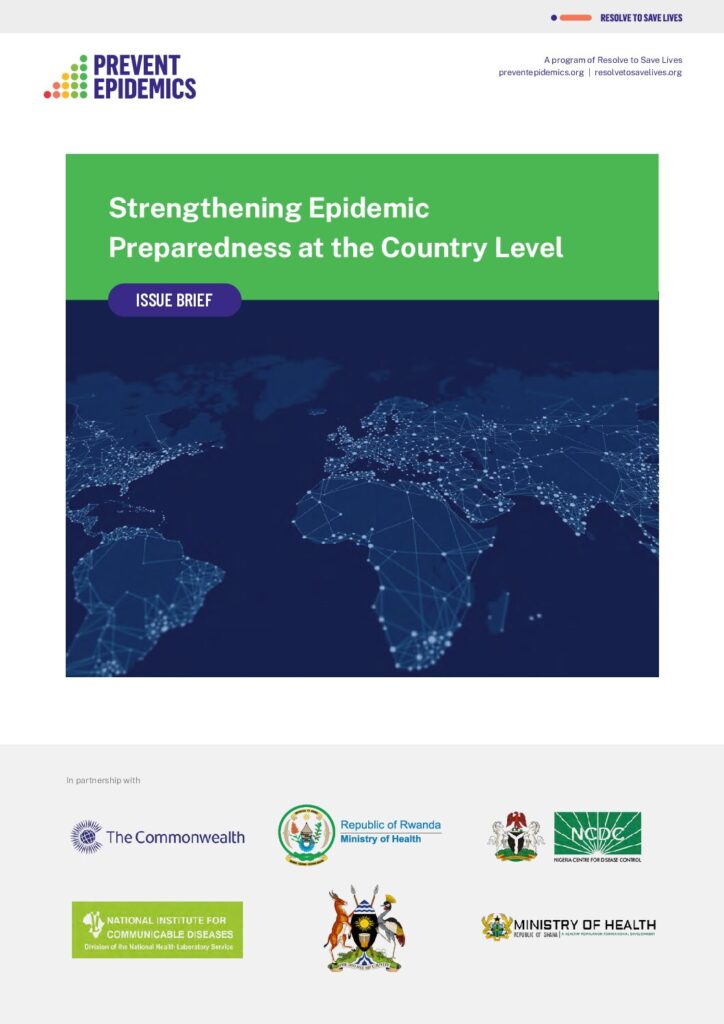
Issue brief presenting five recommendations for strengthening health security at the country level—developed and refined hand-in-hand with governments and partners
Renforcer la préparation aux épidémies au niveau national

Dossier d’information sur le renforcement de la préparation aux épidémies au niveau national.
International Health Regulations FAQ’s
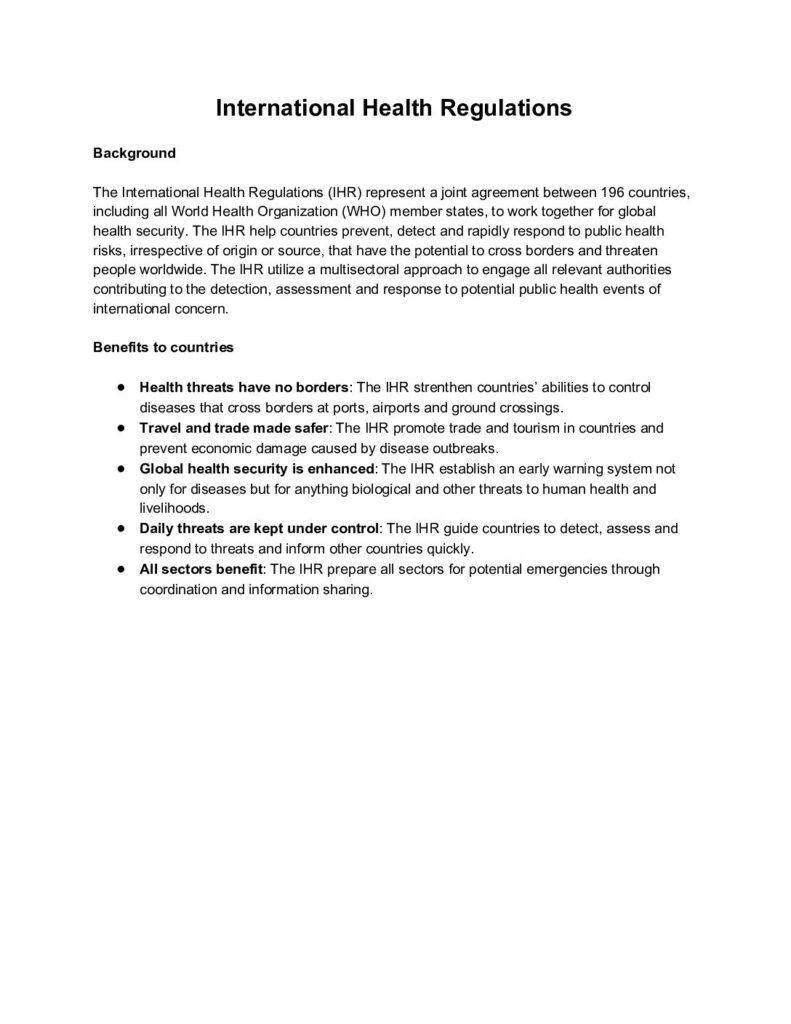
A fact sheet providing an overview of the IHR with FAQ’s.
PMEP 2023-2024: Questions Fréquemment Posées

Questions fréquement posées sur le programme PMEP (Gestion des programmes pour la préparation aux épidémies).
PMEP 2023-2024: Frequently Asked Questions
A FAQ document on program management for epidemic preparedness.
PMEP Overview
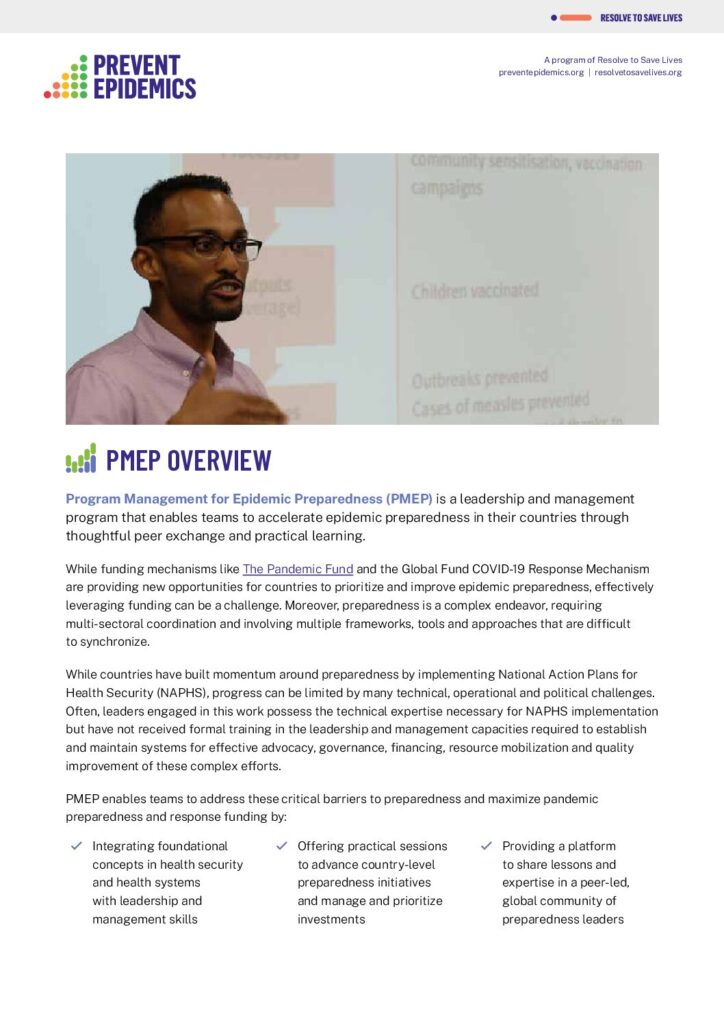
An overview of program management and epidemic preparedness, a leadership and management program that enables teams to accelerate epidemic preparedness in their countries through thoughtful peer exchange and practical learning.
Présentation de PMEP
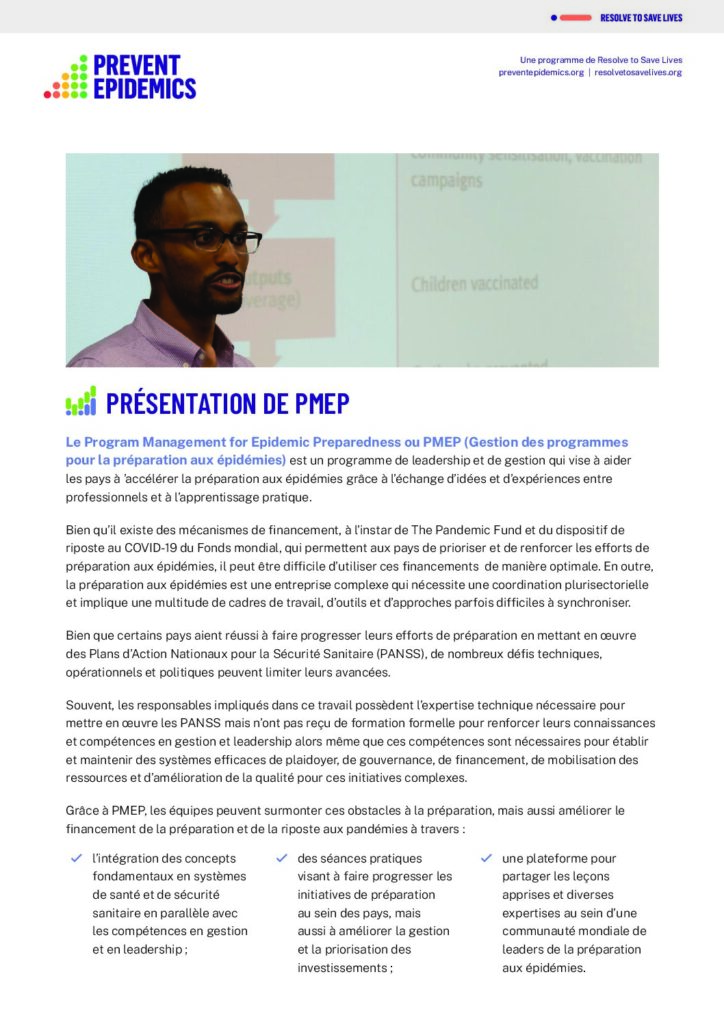
Dossier d’information sur le programme PMEP (Gestion des programmes pour la préparation aux épidémies).
7-1-7 Pilot Project
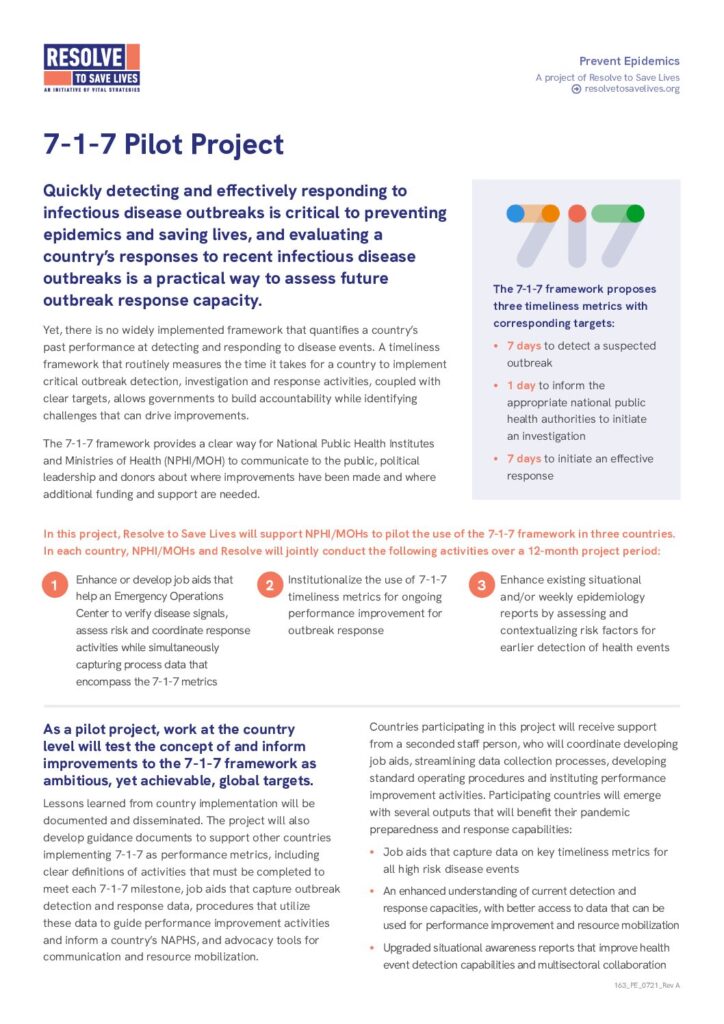
The 7-1-7 framework helps countries strengthen their outbreak detection and response by setting clear targets: 7 days to detect a suspected outbreak, 1 day to inform public health authorities, and 7 days to initiate a response. This pilot project tested the framework in three countries to improve pandemic preparedness and guide performance improvements.
Messages clés de prévention et contrôle des infections (PCI) pour la maladie à virus Ebola dans les structures de soins de santé
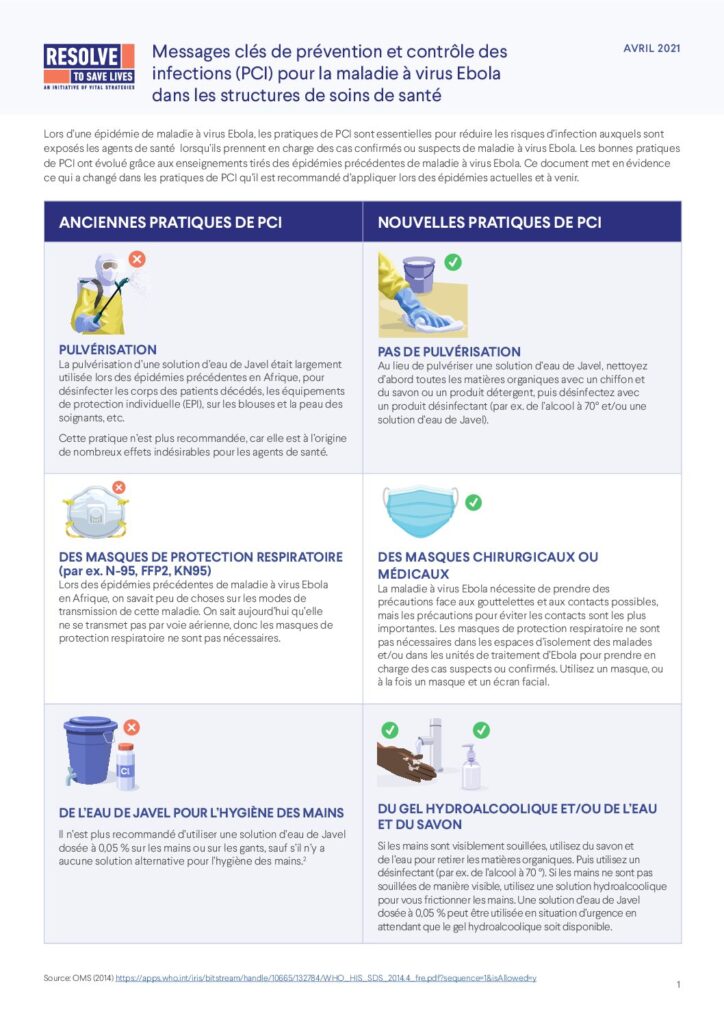
Fiche d’information sur les messages clés de ce qui a changé dans le pratiques de PCI qu’il est recommandé d’appliquer lors des épidémies actuelles et à venir.
Key Infection Prevention and Control (IPC) Messages for Ebola Virus Disease (EVD) at Health Care Facilities
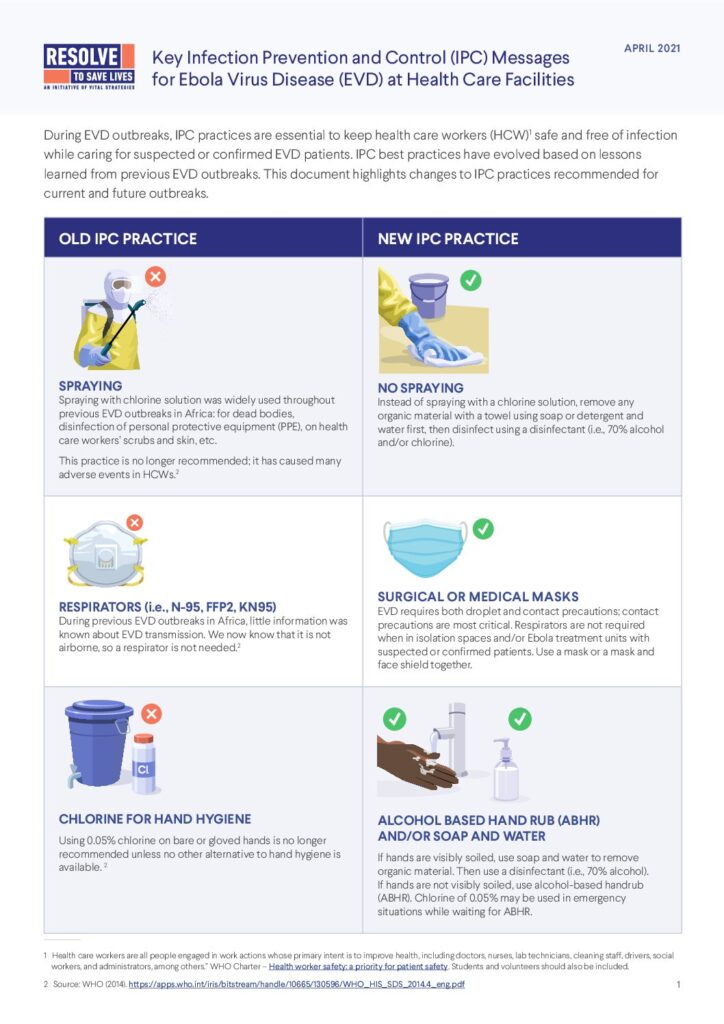
An overview of changes to infection, prevention and control (IPC) practices recommended for Ebola Virus Disease (EVD) outbreaks.
International Health Regulations (IHR) Overview
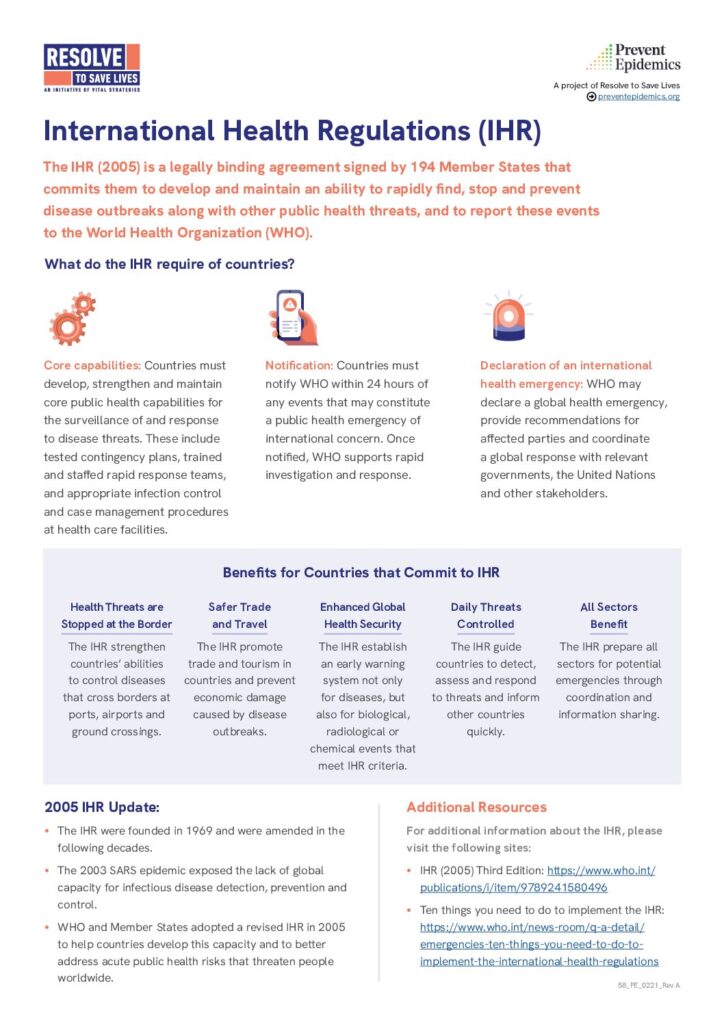
An overview of the International Health Regulations.
Joint External Evaluation
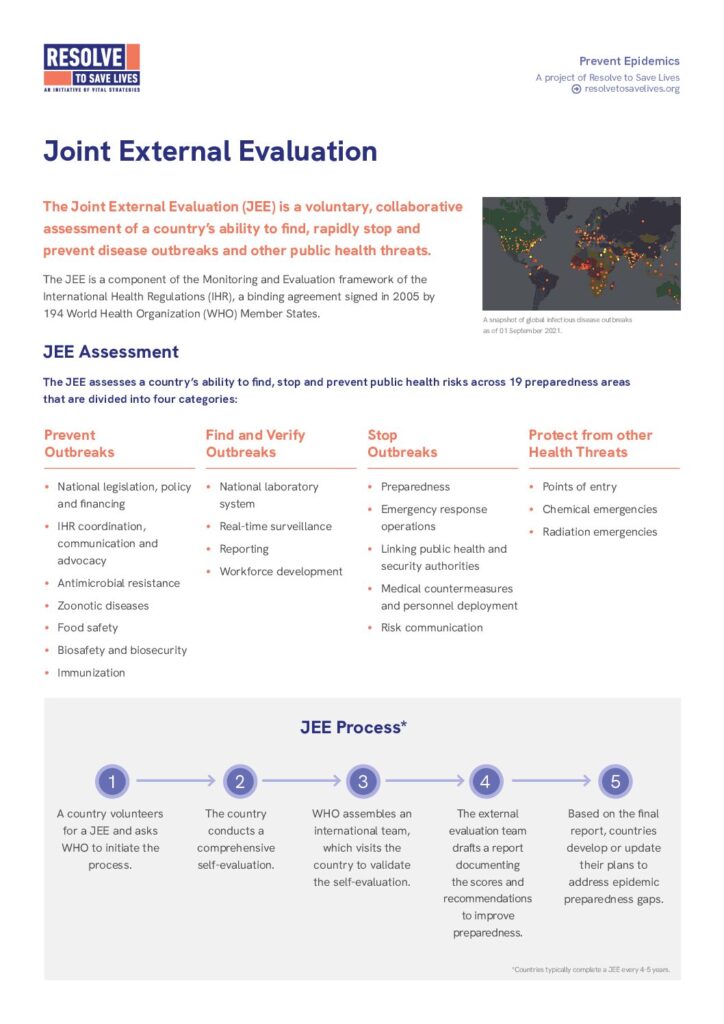
An overview of the Joint External Evaluation (JEE), a voluntary, collaborative assessment of a country’s ability to find, rapidly stop and prevent disease outbreaks and other public health threats.
Measures to Improve COVID-19 Response

A step- by-step framework to use in analyzing and improving their systems of epidemic control. This outlines targets for key completeness measures and time intervals between activities, based on mathematical models of case investigation and contact tracing, to effectively reduce COVID-19 transmission.
Building resilient populations in the face of COVID-19
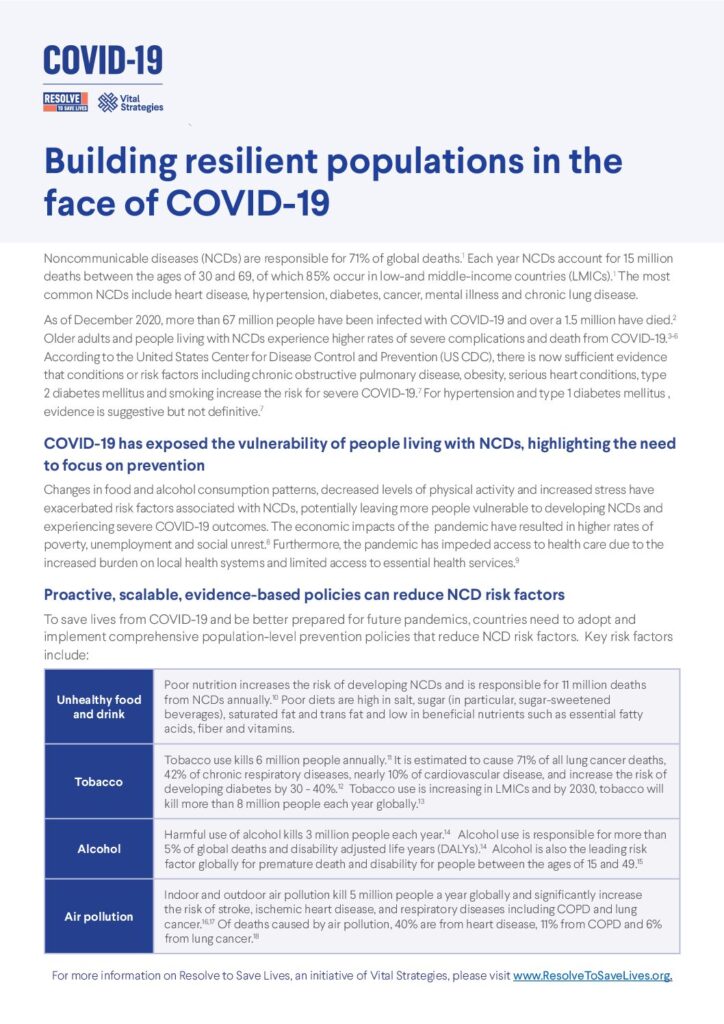
This document highlights the need to reduce noncommunicable disease (NCD) risk factors—such as poor nutrition, tobacco, alcohol use, and air pollution—in order to protect populations from severe COVID-19 outcomes and future pandemics. It recommends evidence-based policies, like trans fat elimination and tobacco control, to build resilience and promote healthier, longer lives.
How event-based surveillance is saving lives in Sierra Leone
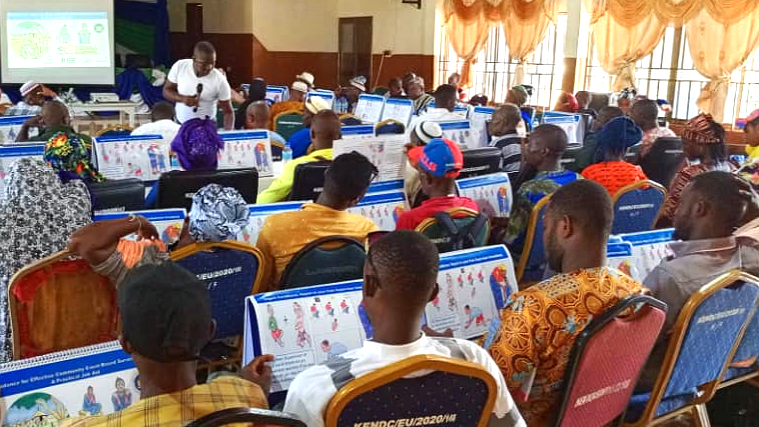
Resolve to Save Lives collaborated with Sierra Leone’s Ministry of Health and global partners to support advanced surveillance for the earliest signs of an outbreak.
How “event-based surveillance” is saving lives Sierra Leone

Resolve to Save Lives partnered with the Sierra Leone Ministry of Health and global partners to support event-based surveillance for the earliest signs of an outbreak. By focusing on advanced signals such as sudden growth in pharmacy sales or drops in school attendance, event-based surveillance will allow the Ministry to detect outbreaks more quickly, thereby […]
Nigeria passes first subnational health security bill

Resolve to Save Lives recently supported the passage of Nigeria’s first subnational health security bill in partnership with the Nigeria Centre for Disease Control and Prevention and the Government of Kano State. This new law brings Kano State into alignment with International Health Regulations (2005) and will allow the state to better protect its people—and […]
How Kano became the first state in Nigeria to pass landmark health security law

Kano is the first state in Nigeria to adopt comprehensive subnational health security legislation.
How Ethiopia established its first ever national infection prevention and control budget
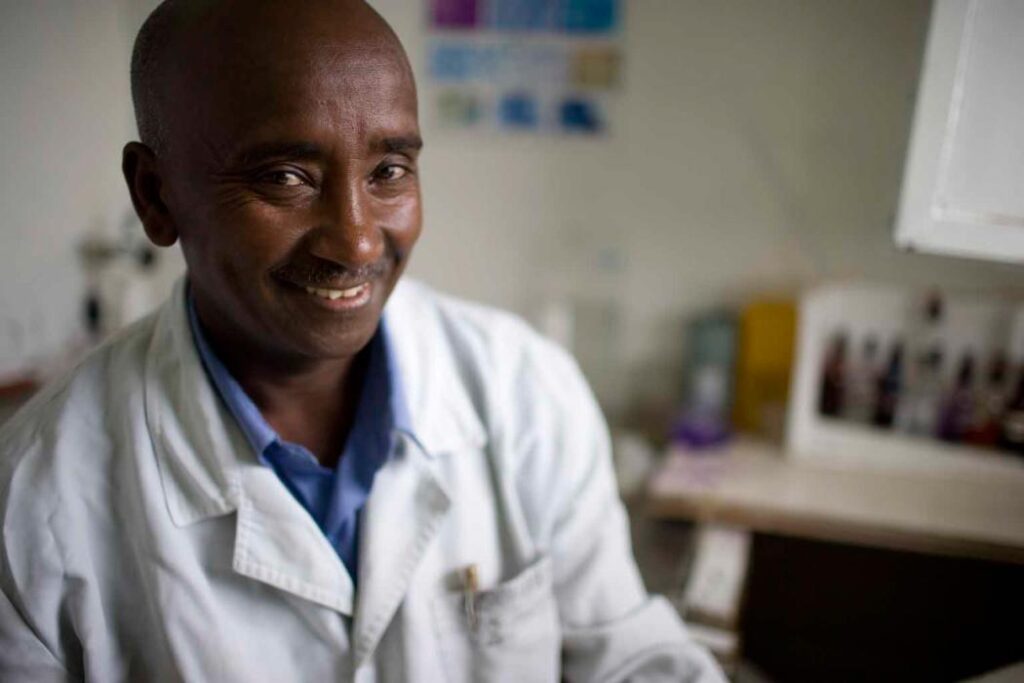
The nation’s recent success represents a milestone for global health security efforts.
New African Women in Digital Health Mentorship Program

The new RTSL-supported African Women in Digital Health Mentorship Program is now accepting applications. Women are integral to achieving Africa’s inclusive growth and sustainable development agenda. This new program will help enhance the representation and leadership of African women in the digital health sector by bolstering their business acumen and leadership skills, supporting them to thrive […]
Growing adoption of 7-1-7 on display at the 2024 Global Health Security Conference

On June 20, 2024, the 7-1-7 Alliance hosted a packed networking breakfast at the Global Health Security Conference in Sydney for partners engaged in the adoption and use of the 7-1-7 target for the timely detection, notification and response of infectious disease outbreaks.
The latest “Epidemics That Didn’t Happen”
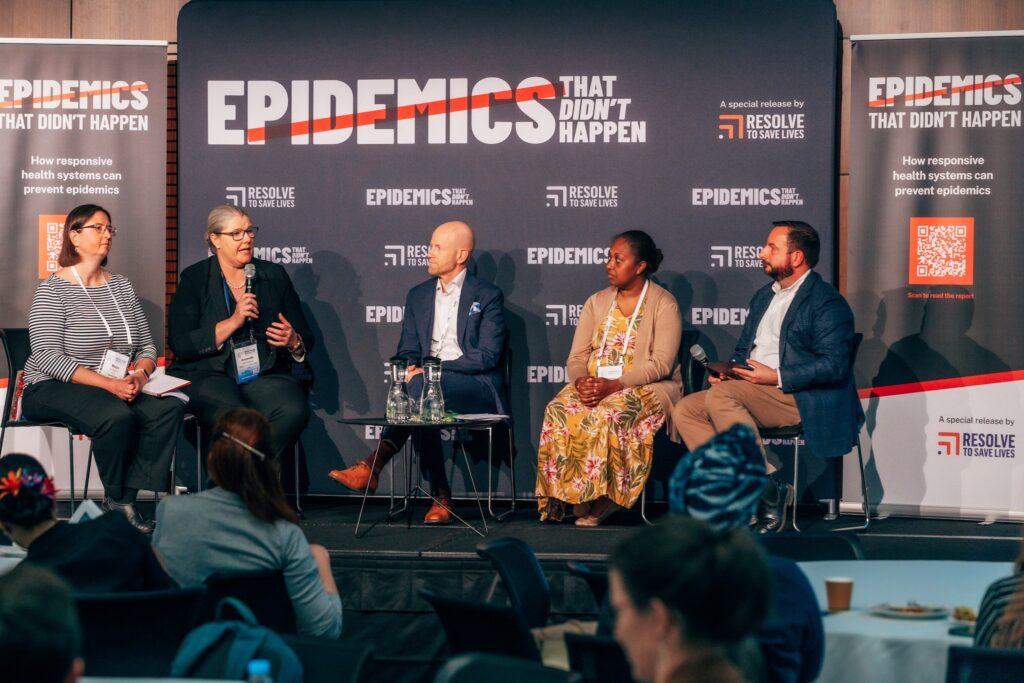
Our third and latest Epidemics That Didn’t Happen report showcases six new case studies from around the world in which responsive health systems that got the basics right stopped infectious disease outbreaks in their tracks. Launched at the 2024 Global Health Security Conference at an event attended by over 100 colleagues and peers, our latest […]
New report offers lessons on stopping disease outbreaks, amid global spread of H5N1
Resolve to Save Lives report shows how public health specialists around the world controlled bird flu and other outbreaks last year June 18, 2024 (New York, NY) – With the highly contagious H5N1 avian influenza (bird flu) spreading worldwide, Finland provides a lesson in how to bring an outbreak under control quickly. After a deadly outbreak […]
What the U.S. can learn from Finland’s H5N1 response
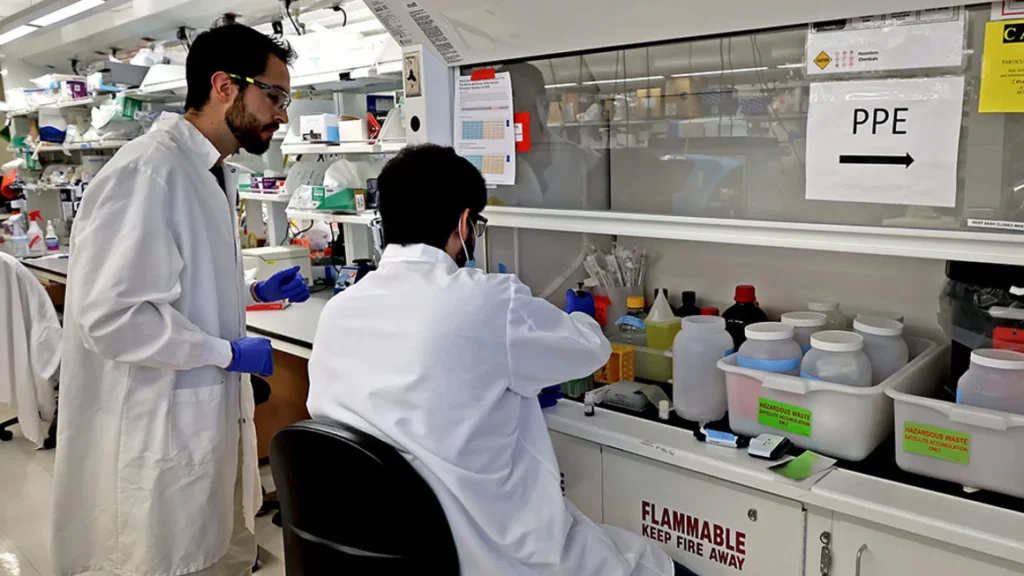
In an essay for CNN, RTSL President and CEO, Dr. Tom Frieden outlines important lessons from a recent outbreak of “bird flu” in Finland that was stopped in its tracks before it could affect a single human being. Dr. Frieden identifies longstanding trust between the farming community and the government, as well as swift action […]
7-1-7 saves lives in South Sudan
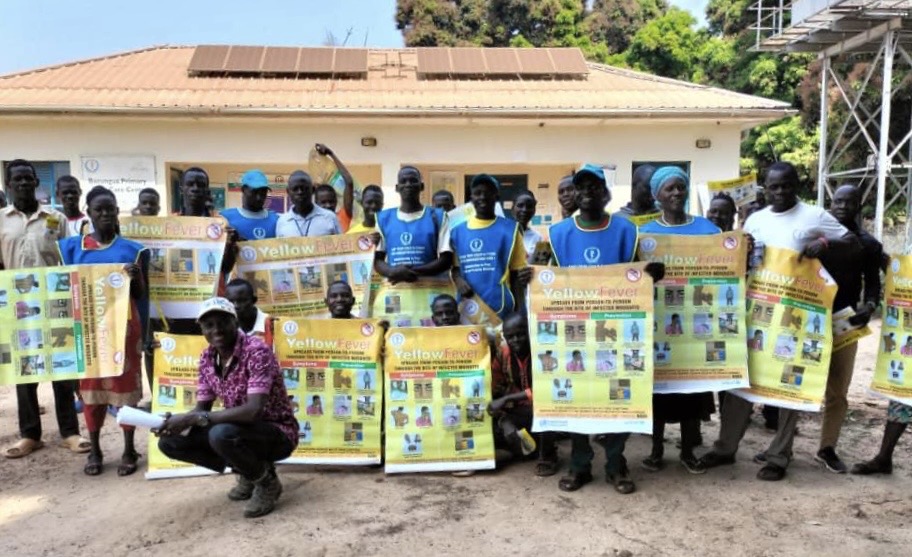
Yellow fever is endemic throughout sub-Saharan Africa. But the 7-1-7 target is helping contain outbreaks quickly.
U.S. public health leaders discuss nationwide adoption of 7‑1‑7
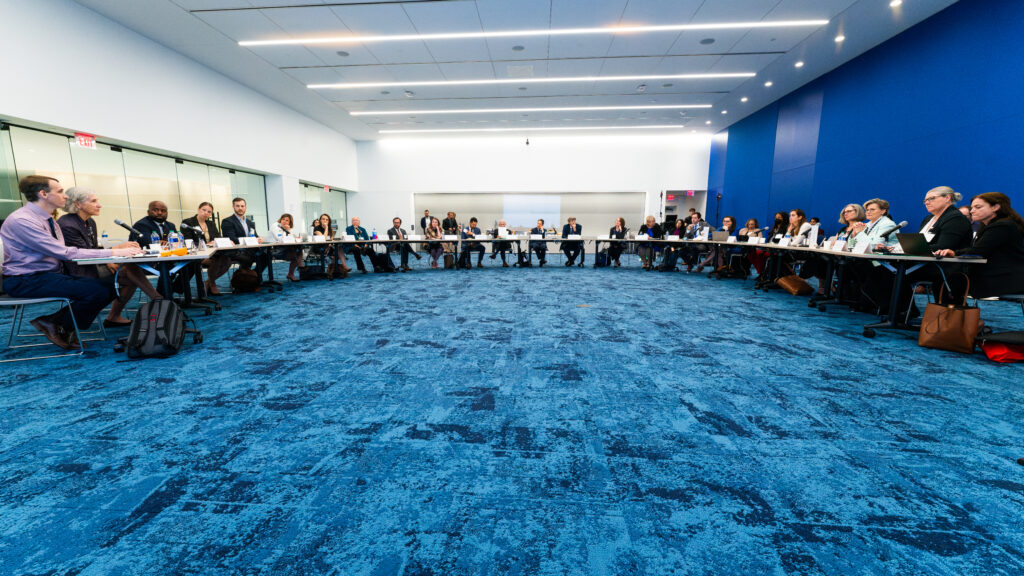
Participants at a Georgetown Center for Global Health Science and Security leadership roundtable discussed a path to a national adoption of the 7-1-7 target in the U.S.
Flexible funding for epidemic response is a game-changer
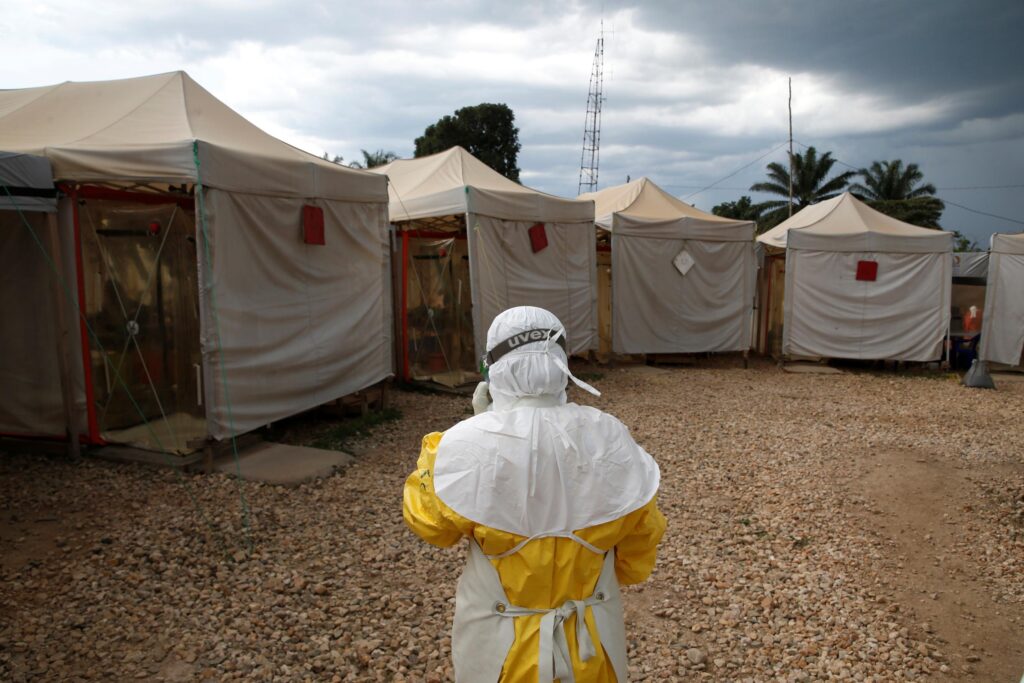
In her latest op-ed for Think Global Health, our Senior Vice President for Prevent Epidemics, Amanda McClelland, explains how early access to flexible funding at the first sign of an outbreak can save tens—or even hundreds of thousands of dollars—in addition to lives and livelihoods. Get the full story at Think Global Health.
Establishing Nigeria’s first subnational public health institute

This historic development makes Kano the first state in Nigeria to establish a public health institute at the subnational level.
New IHR Benchmarks Tool simplifies planning for health emergencies

Developed in partnership with Resolve to Save Lives, this tool helps countries prepare for outbreaks and prevent epidemics.